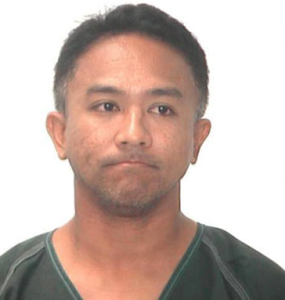Honolulu Army reservist accused of fraud, theft and child molestation

Keoni Rosa, Jr.
By Malia Zimmerman | Watchdog.org
HONOLULU — A former U.S. Army reservist pleaded not guilty to federal wire fraud and theft charges in Honolulu’s U.S. District Court Wednesday.
A Honolulu federal grand jury indicted Keoni Rosa Jr., 36, of Pearl City, Oahu, in June on one count of wire fraud, after the FBI learned through a separate investigation that Rosa allegedly scammed $20,000 in 2012 from eight people with whom he served in the military.
In the same indictment, Rosa is charged with four additional counts of theft of government property, after he allegedly purchased merchandise from the Navy Exchange in Honolulu in 2012 using checks from two bank accounts, one that was closed and another with insufficient funds.
Rosa is currently being held at the Oahu Community Correctional Center on separate charges. According to state court records, he is accused of repeatedly molesting a 13-year-old boy, and has been held in the state prison facility since February on a $150,000 bond. He pleaded not guilty in that case.
The federal fraud indictment said Rosa used the $20,000 he allegedly stole to purchase gifts for himself, his family and friends. A source close to the case said some of the money was used to buy gifts for the child.
One of the ironies in Rosa’s case is he knew and worked with Jason Pascua, a 40-year-old former U.S. Army reservist who is now serving 48 months in prison for running $1.5 million ponzi scheme that defrauded 34 people.
In addition to being president of the Filipino Chamber of Commerce, marketing director of Hawaii Central Credit Union and a candidate for the state House of Representatives, Pascua served in the military, giving him additional credibility with his victims.
Pascua claimed he ran concert and nightclub promotion events in Honolulu and Las Vegas with musical artists and celebrity talent through his company, J2 Marketing, and promised his victims a 25-to-50 percent return on their investment into his business.
Rather than use investors’ money for his concert and nightclub promotions, Pascua spent the money on himself and to create the illusion of legitimate investment returns derived from actual business activities when there was none.
Pascua was sentenced in September 2013 in U.S. District Court and began serving his time in federal prison the following month.
According to Rosa’s June 2014 indictment, he observed Pascua’s Ponzi scheme, and began to solicit investments from eight people, claiming to do so on Pascua’s behalf.
Pascua was unaware of Rosa’s actions, however, and didn’t receive the $20,000.
“The Keoni Rosa investigation was a spin-off from the Jason Pascua case. They were both reservists at Ft. Schafter Flats who knew each other. It’s important to note that they are not accused of conspiring together to commit frauds. All indications are that they operated independently,” said FBI Special Agent Tom Simon, who investigated both cases.
Like Pascua, Rosa also targeted people he served with in the military.
“Many of the alleged victims in this case were members of the armed forces, and Mr. Rosa’s own exemplary record of military service likely gave investors a sense of comfort that their money was in good hands,” Simon said.
According to a 2006 article in the Honolulu Advertiser, Rosa was a sergeant who served in Iraq with the Reserve’s 100th Battalion, 442nd Infantry.
Rosa could be sentenced up to 20 years in federal prison on the wire fraud charge and as much as 10 years per count for theft from the government. Rosa is scheduled to return to U.S. District Court on Monday for a detention hearing.
“While the reported monetary losses in this case are not astronomically high, any time local working families lose a few thousand dollars to an apparent scam, it has to sting. A lot of families here in Hawaii aren’t sitting on giant nest eggs of cash, so cases like this really matter to the alleged victims,” Simon said.
Rosa’s jury trial on the child molestation charges is scheduled for September in First Circuit Court, according to a spokesperson for the Honolulu prosecutor’s office.








